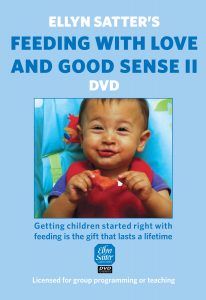

Family Meals Focus
The Ellyn Satter Institute Newsletter
Feeding is parenting
by Ellyn Satter, MS, MSSW, Registered Dietitian and Family Therapist
For a PDF of this newsletter, click here
Authoritative parenting has long been demonstrated to be superior with respect to raising socially and emotionally healthy children1,2 The Satter Division of Responsibility in Feeding (sDOR) is authoritative parenting; Children fed according to sDOR have lower nutritional risk.3 Authoritative parenting correlates with lower incidence of child overweight in first-grade children, with only 3.9% of children of authoritative parents being overweight, compared to 9.8% of children of permissive parents, 9.9% of children of neglectful parents, and 17.1% of children of authoritarian parents.4 Both preschoolers and school-age appeared to have a higher incidence of obesity when they were parented in an authoritarian fashion.5
Models of parenting1,2 |
||
| High expectations for self-mastery | Low expectations for self-mastery | |
| High sensitivity | Authoritative: Maintains clear leadership, limits, and boundaries and at the same time respects child’s opinions, desires, and capabilities. | Permissive: Only inadvertent leadership and boundaries. Indulgent. No routine discipline. |
| Low sensitivity | Authoritarian: Arbitrary rules, strict disciplinarian. Little interest in child’s opinions, desires, or capabilities. | Neglectful: Uninvolved. Does not provide leadership, support or boundaries. |
Patterns of parenting1,2
Nutrition and health professionals can have an impact on parenting by teaching effective feeding based on sDOR.
The four parenting patterns grow out of combinations of the four elements of taking leadership and giving autonomy.
- Authoritative: Parents have clear standards of expected behavior, maintain consistent, effective discipline, and talk and listen. They encourage the child’s independence and individuality and also set limits and enforced rules. Their children are likely to be self-reliant, self-controlled, inquisitive, curious, and content.
- Authoritarian: Parents lay down the law, expect unquestioning compliance, and don’t talk and listen. They don’t discuss rules in advance, let children express their opinions, or let children make decisions about their lives. Their children are obedient, but not spontaneous, affectionate, curious, or creative. They have trouble expressing their needs and working things out with others and therefore tend to be distrustful and socially withdrawn.
- Permissive or indulgent: Parents have few rules or expectations, they don’t directly guide their children’s behavior, avoid exerting their authority, and don’t impose controls or restrictions. They overlook the child’s negative behavior until the child goes too far, then they become highly criticize and punish, sometimes harshly. Their children tend to be unhappy, are lacking in self-reliance and self-control, and don’t take responsibility.
- Neglectful: Parents are, indifferent, remote and uninvolved. They provide neither rules nor support. Their children are frightened and lonely and have serious cognitive, emotional, behavioral, and often medical problems.
Patterns of parenting with feeding
Parents feed authoritatively when they 1) observe and understand their child and 2) do their feeding jobs and let their child do her eating jobs. According to the Satter Feeding Dynamics Model (fdSatter), feeding according to sDOR provides both leadership and autonomy and is authoritative parenting.6 In fdSatter, expectation for self mastery becomes leadership; sensitivity becomes autonomy.
Patterns of feedingIn word or deed, here is what parents say with respect to feeding: |
||
| High leadership | Low leadership | |
| High autonomy | Authoritative: “It is time for dinner (snack). Here is what we have to eat. You may eat it or not. You may eat again at snack (meal) time.” | Permissive: “What would you like? When would you like it?” |
| Low autonomy | Authoritarian: “Here is your food. Eat it.” | Neglectful: “Don’t bother me. Get it yourself.” |
In taking leadership with feeding, the parent expects and assumes that the child will work toward self-mastery – that they will gain Eating Competence.7 That is, they will retain positive attitudes about eating and about food, learn to behave appropriately at meals, pick and choose from food that parents make available, eat as much or as little as they need, and learn to enjoy the food that parents eat. In giving the child autonomy with the how much and whether of eating, the parent is sensitive to and respectful of the child’s own drive to learn and grow as well as the child’s own preferences and needs. Parents who give a child autonomy remain connected. They let the child be independent and self directing within the context that they provide, and at the same time remain warm and attentive to the child.
The take-home message
If you are a nutrition or health professional, don’t try to teach parenting. You don’t have the training, and you could do more harm than good. But if you study and learn authoritative, evidence-based feeding practice according to fdSatter,8-11 you can teach feeding. On their own, parents often apply feeding principles to parenting overall. If you are a mental health professional, learn recommended feeding practice. Then consider entering families via their parenting with feeding. It is vague and overwhelming to address parenting to improve a child’s low self esteem, anxiety, or depression. Helping parents do a good job with feeding, on the other hand, is concrete, practical, and achievable.
References
- Maccoby EE, Martin JA. Socialization in the context of the family: parent-child interaction. In: Mussen PHe, ed. Handbook of Child Psychology. Wiley; 1983:1-101.
- Baumrind D. Current patterns of parental authority. Developmental Psychology Monograph. 1971;4(1 pt.2):1-103.
- Lohse B, Mitchell DC. Valid and reliable measure of adherence to Satter Division of Responsibility in Feeding. J Nutr Educ Behav. 2021:211-222. doi:10.1016/j.jneb.2020.11.007
- Rhee KE, Lumeng JC, Appugliese DP, Kaciroti N, Bradley RH. Parenting styles and overweight status in first grade. Pediatrics. 2006;117:2047-2054.
- Kakinami L, Barnett TA, Seguin L, Paradis G. Parenting style and obesity risk in children. Prev Med. Jun 2015;75:18-22. doi:10.1016/j.ypmed.2015.03.005
- Satter E. The Satter Feeding Dynamics Model of child overweight definition, prevention and intervention. In: O’Donahue W, Moore BA, Scott B, eds. Pediatric and Adolescent Obesity Treatment: A Comprehensive Handbook. Taylor and Francis; 2007:287-314.
- Satter E. Eating Competence: definition and evidence for the Satter Eating Competence Model. J Nutr Educ Behav. 2007;39:S142-S153.
- Satter E. Feeding with Love and Good Sense II: DVD Series by Ellyn Satter. Ellyn Satter Associates; 2011. http://www.ellynsatter.com/ellyn-satters-feeding-with-love-and-good-sense-ii-videos-c-0_5017_5022.html
- Satter EM. Secrets of Feeding a Healthy Family. Kelcy Press; 2008.
- Satter EM. Your Child’s Weight: Helping Without Harming. Kelcy Press; 2005.
- Satter EM. Child of Mine: Feeding with Love and Good Sense. Bull Publishing; 2000.
Explore
To understand how to be faithful about doing your jobs with feeding and scrupulous about letting your child do her jobs with eating. read Ellyn Satter’s Child of Mine: Feeding with Love and Good Sense.

To see what good feeding looks like as well as to read about it, see Ellyn Satter’s Feeding with Love and Good Sense DVD II. For the home use version, click here.

